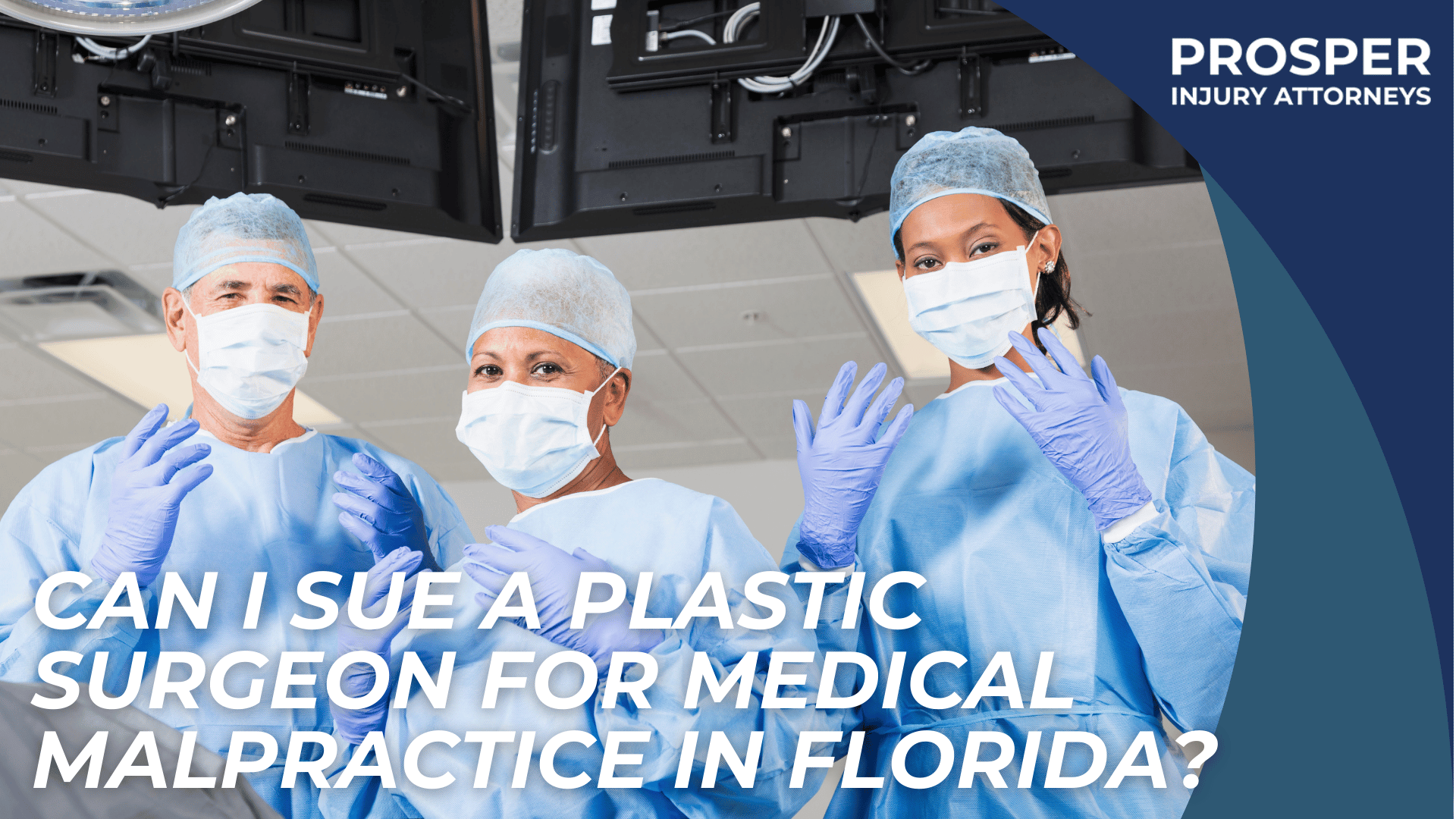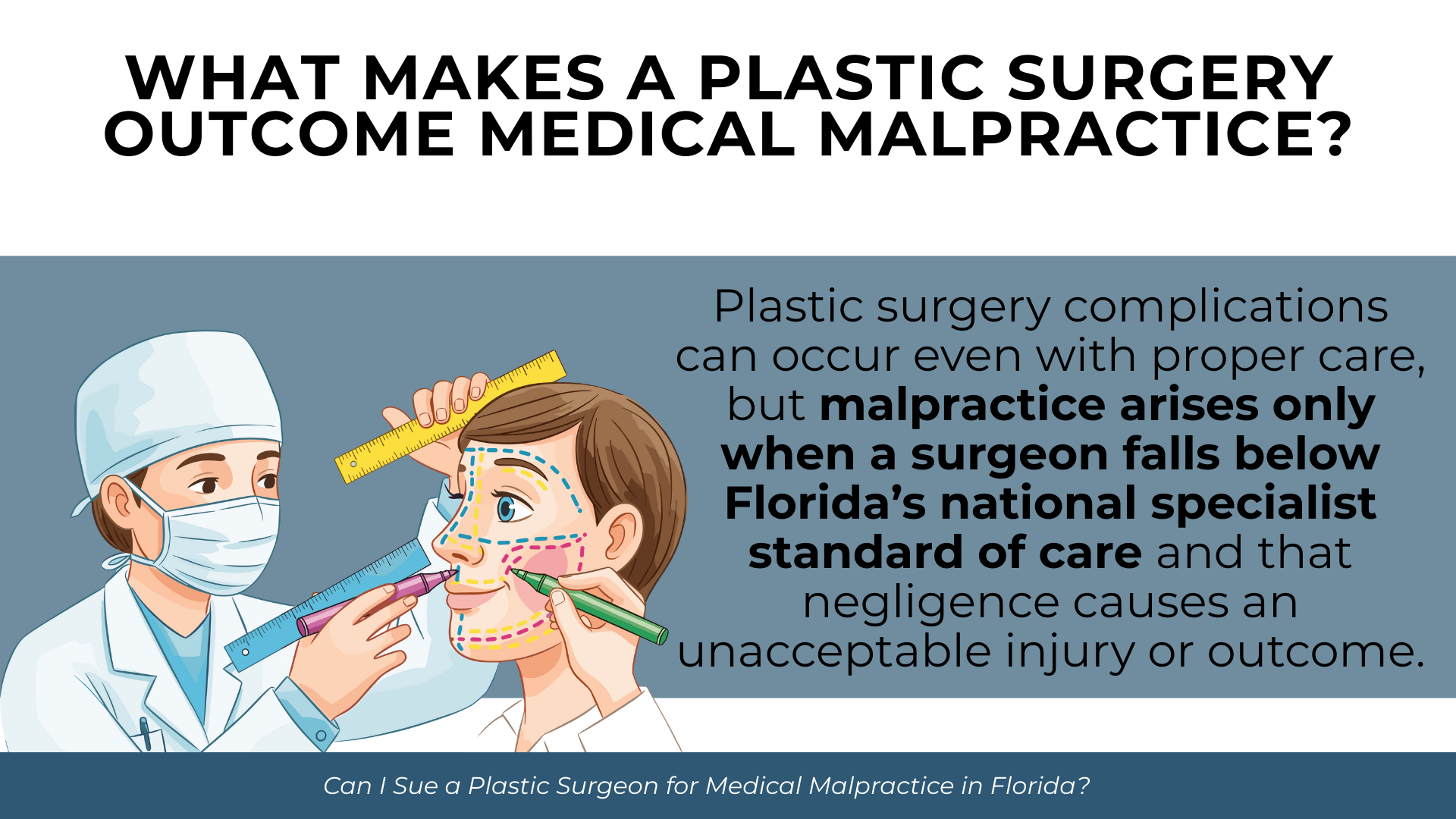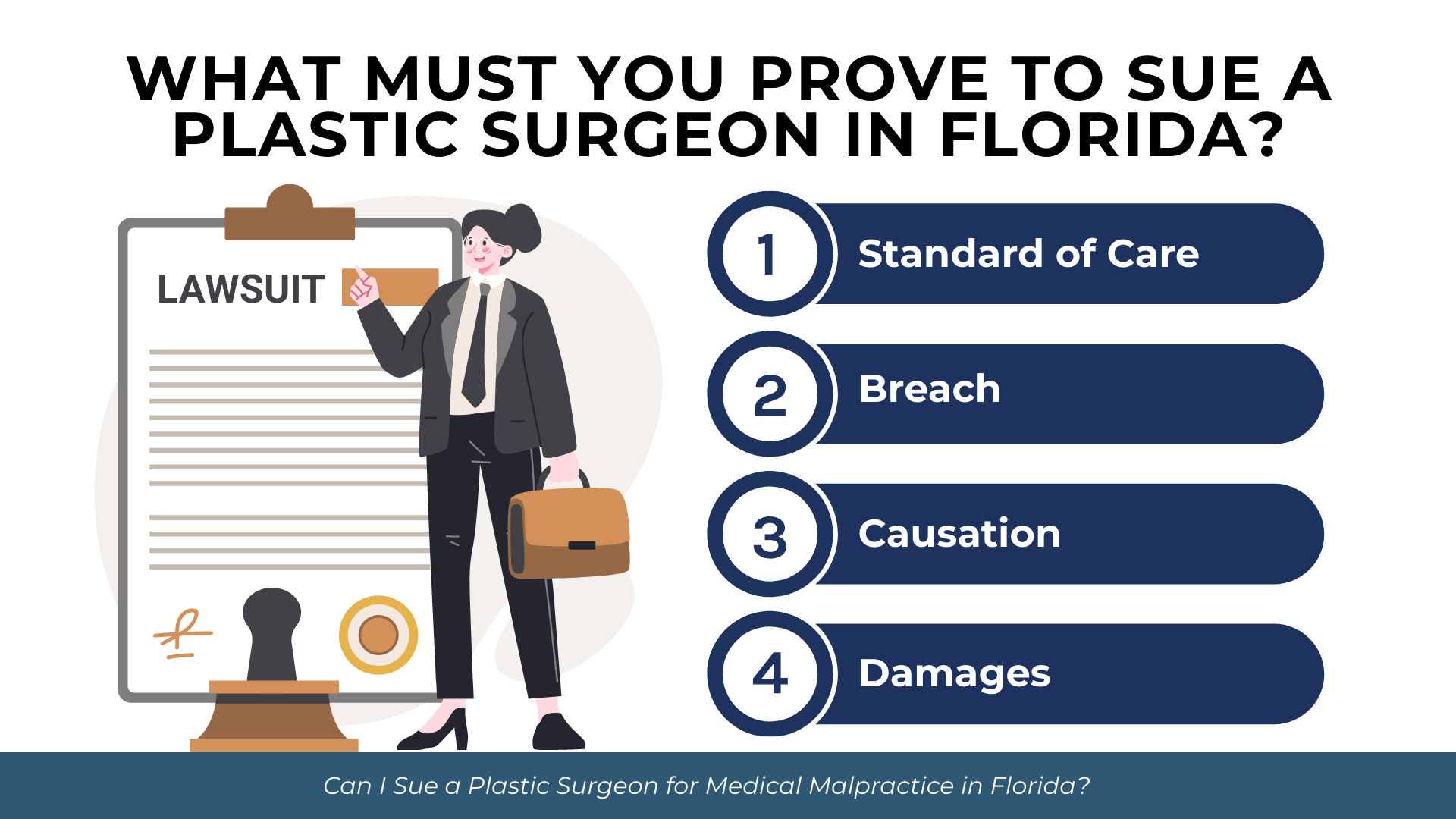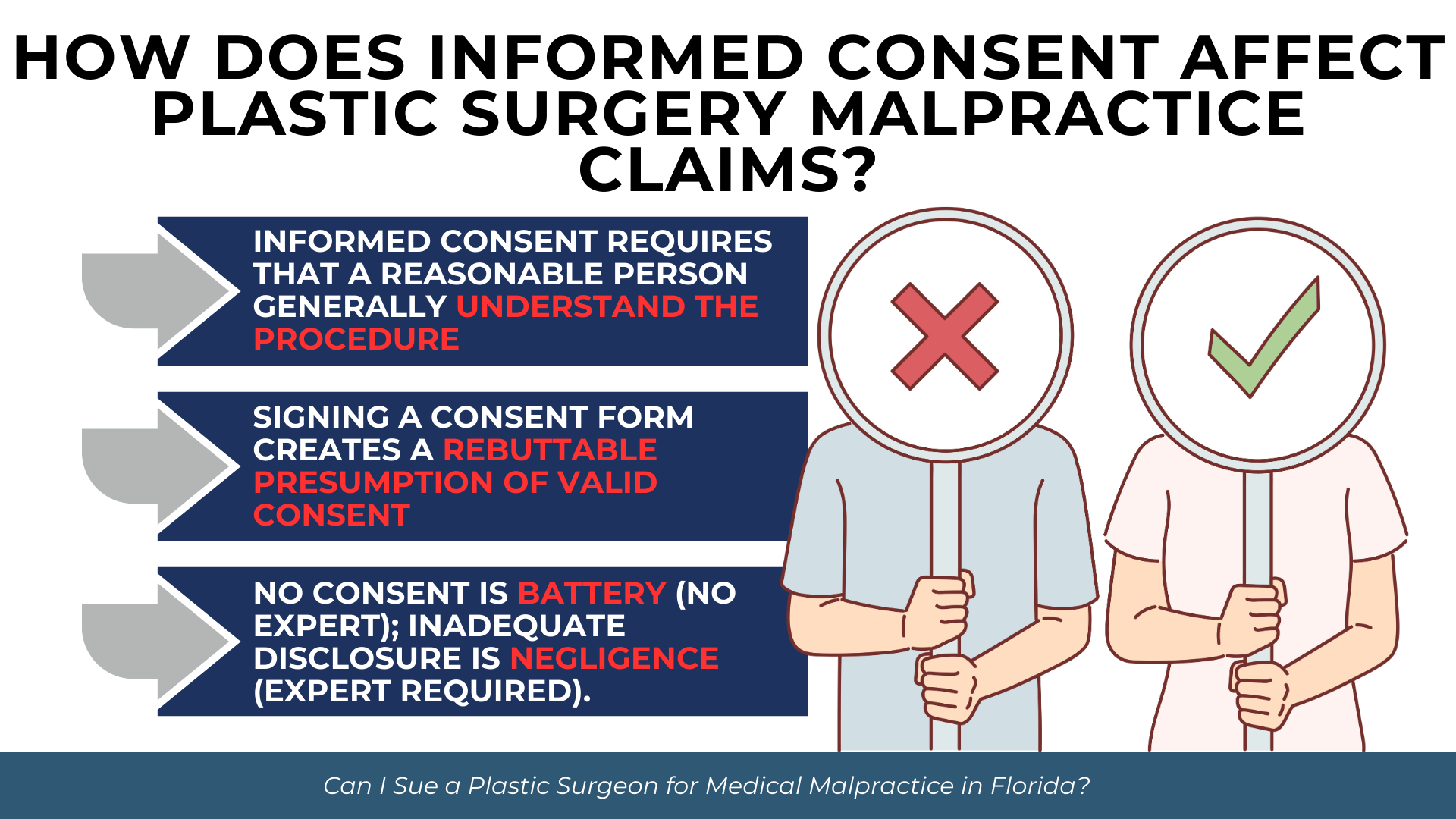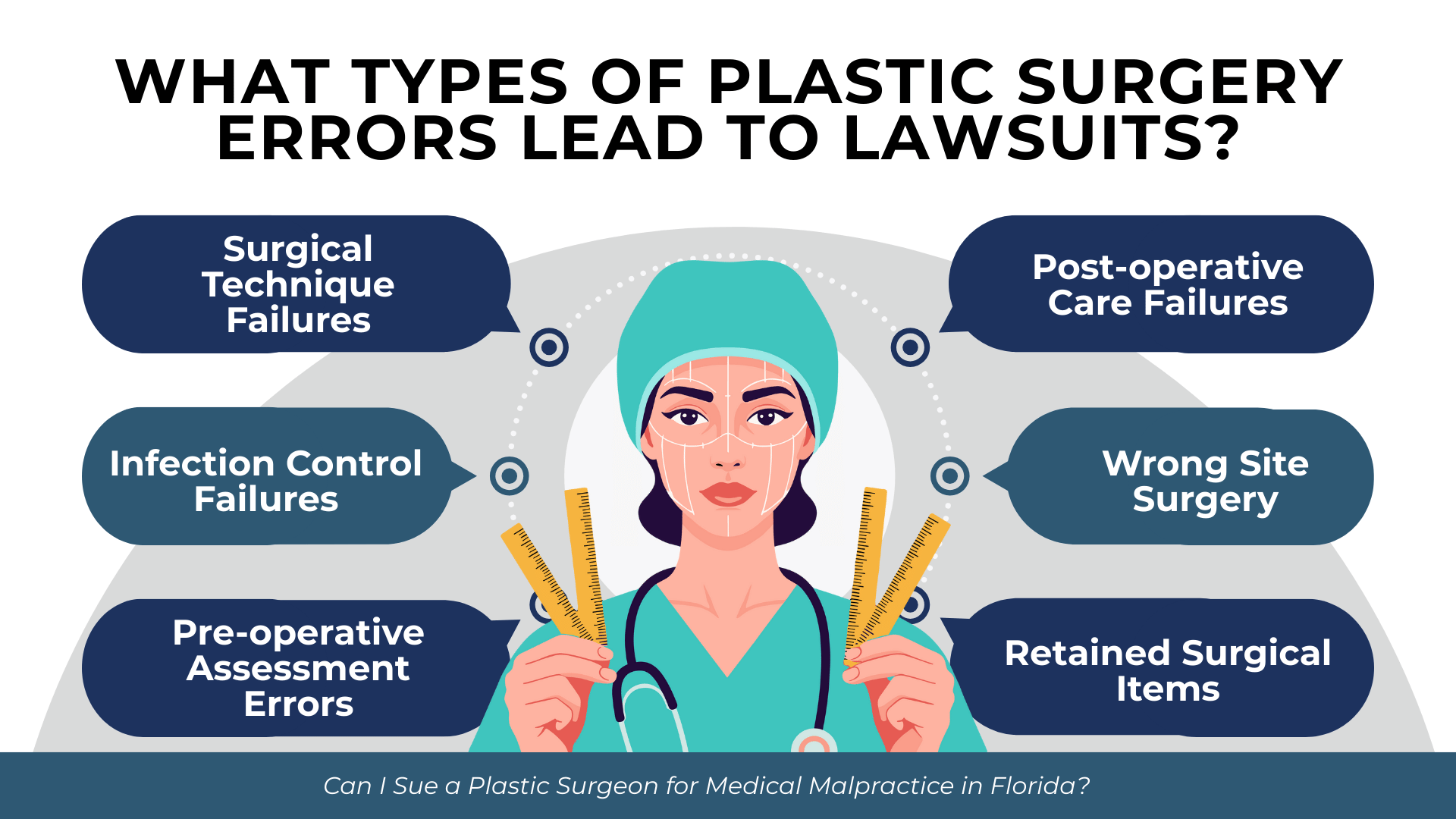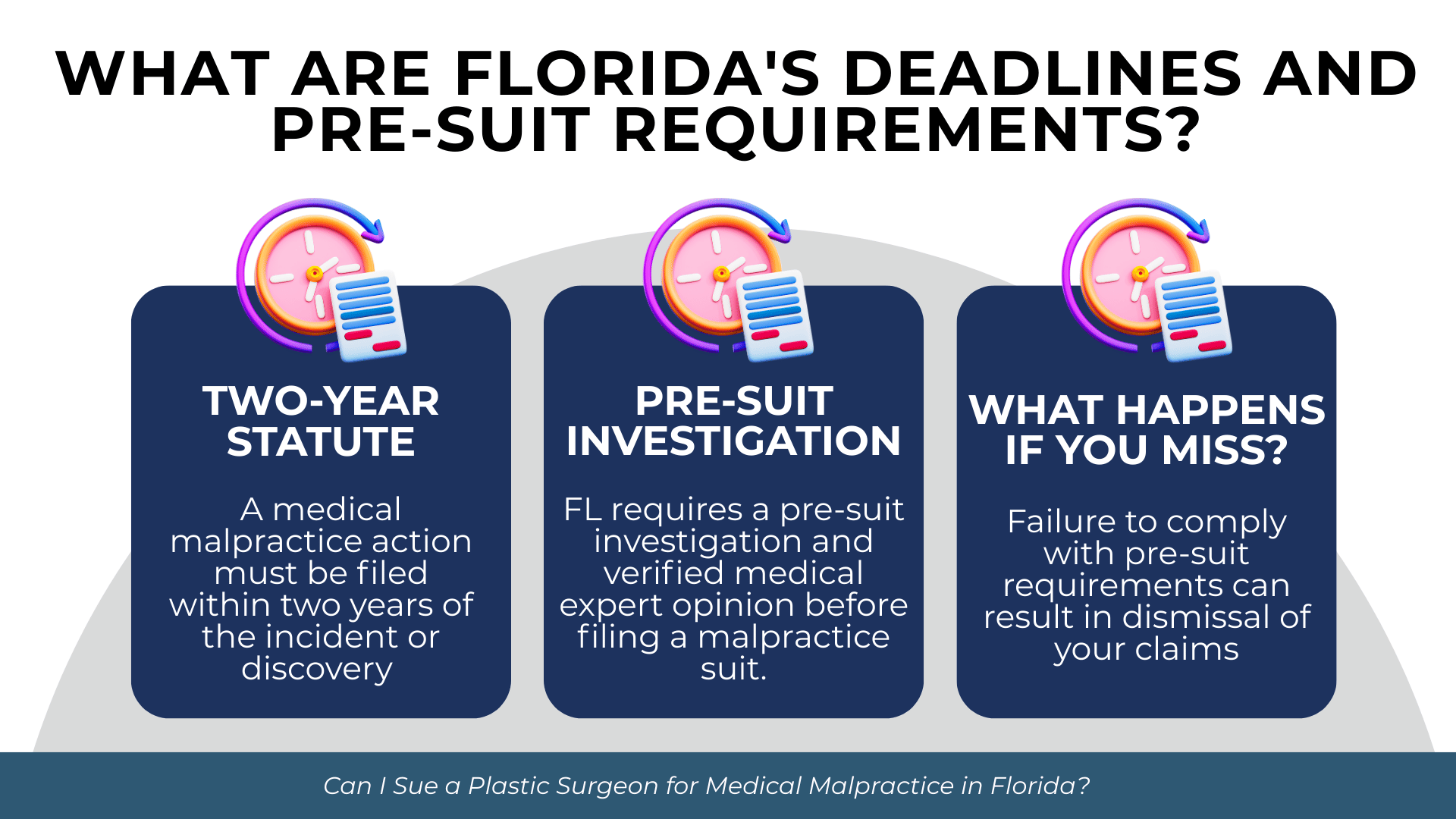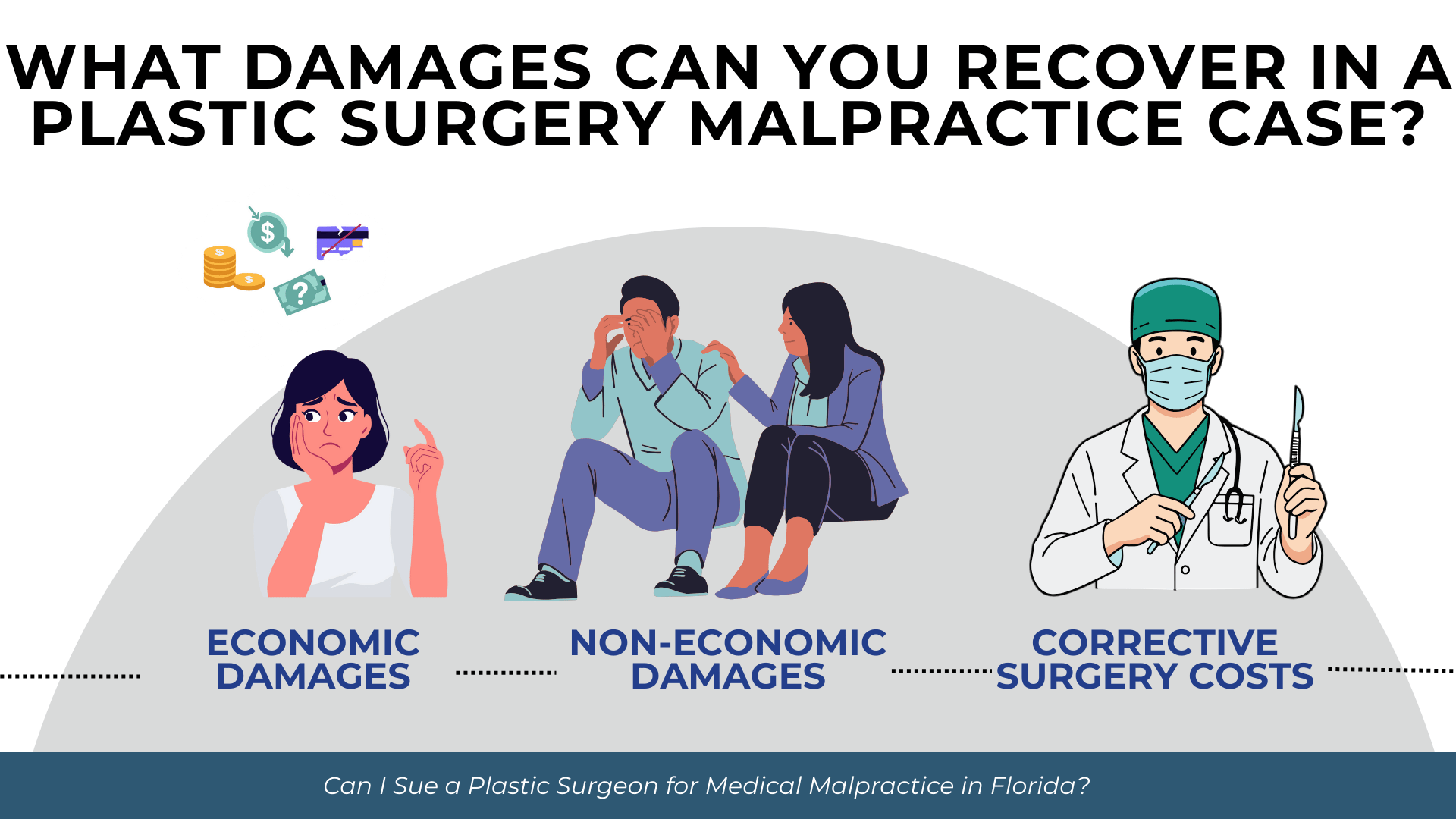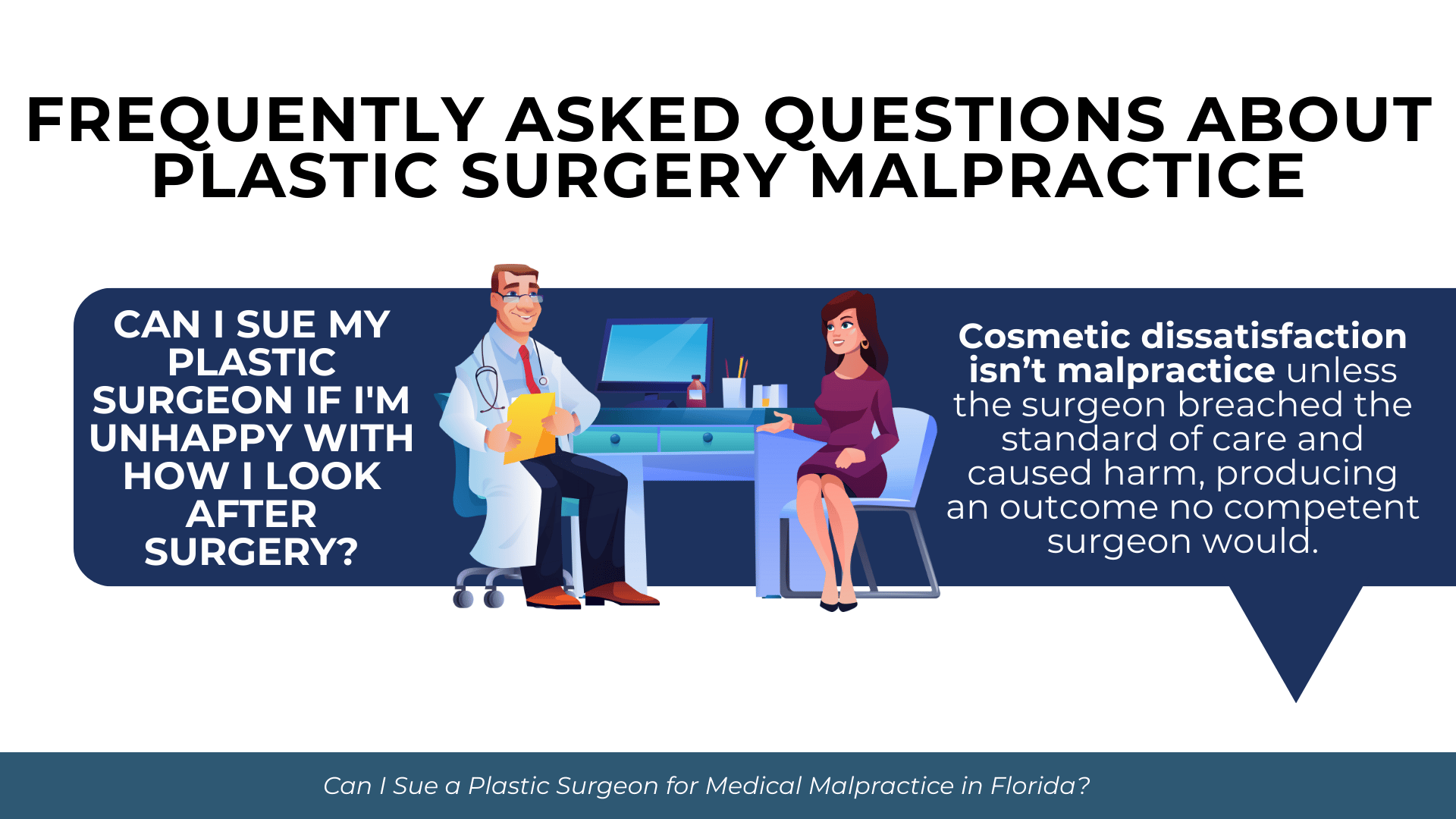Plastic surgery patients trust their surgeons to deliver safe procedures and honest assessments of realistic outcomes. When that trust is broken through negligence, patients may suffer disfigurement, chronic pain, infection, or the need for costly corrective procedures. Florida law allows patients to pursue medical malpractice claims against plastic surgeons who fail to meet professional standards, but not every disappointing outcome qualifies as malpractice.
The distinction between negligence and an accepted surgical risk is often the central question in plastic surgery malpractice cases. Understanding this distinction, along with Florida’s specific legal requirements, is essential for anyone considering a lawsuit against a plastic surgeon.
What Makes a Plastic Surgery Outcome Medical Malpractice?
The Difference Between Negligence and Known Complications
All surgical procedures carry inherent risks. According to the American Society of Plastic Surgeons (2018), outpatient plastic surgery has an overall complication rate of 0.98%, with hematoma accounting for over 80% of complications requiring a return to the operating room. Infection occurs in approximately 0.06% of cases, and blood clot complications occur in 0.05%.
These complications can occur even when a surgeon performs the procedure correctly. A complication that falls within the known risks of a properly performed procedure is generally not malpractice. Malpractice occurs when the surgeon’s conduct falls below the prevailing professional standard of care and that substandard care causes injury.
The question is not whether something went wrong but whether the surgeon did something wrong.
Understanding Florida’s Standard of Care for Plastic Surgeons
Under Fla. Stat. § 766.102, Florida holds medical professionals to “that level of care, skill, and treatment which, in light of all relevant surrounding circumstances, is recognized as acceptable and appropriate by reasonably prudent similar health care providers.”
For plastic surgeons, this means the standard is set by what other board-certified plastic surgeons would consider acceptable. Florida has largely abandoned the locality rule, meaning your surgeon is held to a national professional standard for clinical care rather than just what is customary in your local community.
When a plastic surgeon practices within their specialty, they must meet the standard expected of a specialist. A general surgeon performing a facelift would be judged against what a plastic surgeon specializing in facial procedures would do.
When Cosmetic Dissatisfaction Crosses Into Malpractice
Unhappiness with aesthetic results does not automatically constitute malpractice. Patients may have unrealistic expectations, or results may fall within the range of acceptable outcomes even if they are not what the patient hoped for.
However, cosmetic dissatisfaction can become actionable when the outcome reflects a departure from the standard of care. Examples include asymmetry caused by improper surgical technique, visible scarring from poor incision placement, nerve damage from reckless tissue handling, or results that no competent plastic surgeon would consider acceptable.
The challenge in cosmetic cases is proving that the outcome was not simply an acceptable variation but rather the product of negligent technique.
What Must You Prove to Sue a Plastic Surgeon in Florida?
Call us today at (305) 694-2676 or
contact us online for a free case evaluation.
Hablamos español.


Florida medical malpractice claims require proving four elements. Each element must be established by the greater weight of the evidence, meaning it is more likely true than not.
The four elements you must prove are:
- Standard of care: What a reasonably prudent plastic surgeon would have done under similar circumstances
- Breach: That your surgeon failed to meet that standard through action or omission
- Causation: That the breach was a substantial factor in causing your injury
- Damages: That you suffered actual harm as a result
Failing to prove any one of these elements defeats the claim entirely.
Establishing the Standard of Care Through Expert Testimony
Under Fla. Stat. § 766.102(5)(a), your expert witness must be a physician who specializes in the same specialty as the defendant and who has devoted professional time during the three years immediately preceding the incident to active clinical practice, instruction, or research in that specialty.
For a claim against a board-certified plastic surgeon, you typically need another board-certified plastic surgeon to testify about what the standard of care required. The expert must hold an active and valid license and must conduct a complete review of all pertinent medical records before offering an opinion.
Proving the Surgeon Breached That Standard
Breach occurs when the surgeon’s conduct deviates from what the standard of care required. Under Fla. Stat. § 766.102(1), the patient bears the burden of proving breach by the greater weight of the evidence.
For affirmative medical intervention, such as surgery, breach requires showing the injury was not within the necessary or reasonably foreseeable results of the procedure when performed according to the standard of care. If a surgeon performs liposuction using outdated techniques that competent plastic surgeons abandoned years ago, and the patient suffers contour irregularities as a result, that may constitute breach.
Connecting the Breach to Your Injury
Florida requires proof of causation under the “more likely than not” standard. In Gooding v. University Hospital Building, Inc., 445 So. 2d 1015 (Fla. 1984), the Florida Supreme Court established that a plaintiff must show injury more likely than not resulted from the defendant’s negligence.
Florida has rejected the loss of chance doctrine. You cannot recover for a decreased chance of a better outcome. You must prove that the surgeon’s negligence was a substantial factor in causing the specific harm you suffered.
Documenting Your Damages
You must prove actual damages. These can include past and future medical expenses for corrective procedures, lost income during recovery, physical pain and suffering, emotional distress, and disfigurement.
Photographs documenting your condition before surgery, immediately after, and throughout recovery are critical evidence. Your medical records must establish the timeline and nature of your injuries.
How Does Informed Consent Affect Plastic Surgery Malpractice Claims?
What Plastic Surgeons Must Disclose Before Surgery
Under Fla. Stat. § 766.103, informed consent requires that a reasonable individual would have a general understanding of the procedure, medically acceptable alternatives, and substantial risks inherent in the proposed treatment.
Plastic surgeons must disclose known risks such as scarring, infection, asymmetry, nerve damage, and the possibility that results may not meet expectations. For elective cosmetic procedures, this disclosure obligation is particularly important because patients are choosing to undergo surgery without medical necessity.
When Consent Forms Do Not Protect the Surgeon
Signing a consent form raises a rebuttable presumption of valid consent under Fla. Stat. § 766.103(4), but this presumption is not conclusive. In Public Health Trust of Dade County v. Valcin, 507 So. 2d 596 (Fla. 1987), the Florida Supreme Court held that fraudulent oral misrepresentations can vitiate (overcome) a written consent form.
If your surgeon told you the procedure had minimal risks while the consent form disclosed significant risks, or if the surgeon misrepresented their experience or qualifications, the consent form may not protect them.
Additionally, informed consent does not shield a surgeon from negligence in performing the procedure. Even if you consented to the risk of infection, that consent does not excuse the surgeon’s failure to maintain sterile technique.
Battery vs. Negligence in Consent Cases
The distinction matters for what you must prove. Complete absence of consent, such as performing a procedure you never agreed to or operating on the wrong body part, constitutes battery. Battery claims do not require expert testimony because the wrong is obvious to a layperson.
Inadequate disclosure of risks constitutes negligence rather than battery. Negligence claims require expert testimony to establish what should have been disclosed and whether a reasonable patient would have made a different decision with proper information.
What Types of Plastic Surgery Errors Lead to Lawsuits?
Plastic surgery malpractice claims arise from various categories of error. Understanding common patterns helps patients recognize when their experience may reflect negligence rather than an accepted complication.
Common plastic surgery errors that lead to litigation include:
- Surgical technique failures: Improper incision placement, excessive tissue removal, asymmetrical results from uneven technique, nerve damage from careless dissection, and failure to achieve hemostasis leading to hematoma
- Infection control failures: Inadequate sterile technique, failure to recognize early infection signs, delayed or inappropriate antibiotic treatment, and contaminated implants or surgical instruments
- Pre-operative assessment errors: Failing to identify contraindications such as bleeding disorders or medication interactions, inadequate medical history review, and failure to recognize patients who are poor surgical candidates
- Post-operative care failures: Inadequate monitoring during recovery, failure to respond to patient complaints suggesting complications, delayed recognition of hematoma or seroma, and premature discharge from care
- Wrong-site surgery: Operating on the wrong side, wrong area, or wrong patient — errors that according to Joint Commission Sentinel Event Data (2024) accounted for 68% of wrong surgery sentinel events nationally
- Retained surgical items: Sponges, needles, or instruments left inside the patient — which under Fla. Stat. § 766.102(3)(b) constitute prima facie evidence of negligence
According to Florida AHCA data (FY 2007-2008), 22% of the most serious reportable surgical adverse incidents in Florida ambulatory surgery centers involved wrong-site surgery, and 11% required surgery to remove retained foreign objects.
Surgical Technique Failures
Technical errors are the most common basis for plastic surgery malpractice claims. These include improper suturing that leads to visible scarring, asymmetric results from uneven tissue manipulation, contour irregularities in body sculpting procedures, and nerve damage causing numbness or loss of function.
The challenge is distinguishing poor technique from acceptable variation in results. Expert testimony is essential to establish that the outcome reflects a departure from surgical standards rather than an inherent limitation of the procedure.
Infection and Post-Operative Care Errors
While the ASPS study (2018) found a 0.06% infection rate, infections can occur despite proper technique. Malpractice arises when the infection results from inadequate sterile technique, contaminated equipment, or failure to recognize and treat developing infection.
Post-operative monitoring failures can transform a manageable complication into a serious injury. Delayed response to signs of infection, failure to drain a hematoma, or premature discharge when complications are developing can all constitute negligence.
Anesthesia-Related Injuries
Anesthesia complications in plastic surgery may involve the plastic surgeon, an anesthesiologist, or a nurse anesthetist depending on who administered the anesthesia and how. Medication errors, airway management failures, and failure to monitor vital signs during sedation can cause brain injury or death.
When anesthesia is administered at a surgery center rather than a hospital, questions of vicarious liability may arise regarding the facility’s responsibility for the anesthesia provider’s conduct.
Wrong-Site and Retained Object Errors
Wrong-site surgery and retained surgical items are “never events” — errors that should never occur with proper protocols. Under Florida law, discovery of a retained foreign body such as a sponge or surgical instrument creates prima facie evidence of negligence, shifting the burden to the defendant to explain how it occurred.
These cases are often easier to prove than technique-based claims because the error is self-evident and does not require extensive expert analysis of whether surgical judgment was reasonable.
What Are Florida’s Deadlines and Pre-Suit Requirements?
Get started with your complimentary case evaluation today;
call us at (305) 694-2676 or reach us online using our
secure contact form.


The Two-Year Statute of Limitations
Under Fla. Stat. § 95.11(5)(c), you must commence a medical malpractice action within two years from the time the incident occurred or within two years from when you discovered or should have discovered the injury with due diligence.
However, Florida also imposes a four-year statute of repose. Regardless of when you discover the injury, you generally cannot file suit more than four years from the date of the incident. In cases involving fraud, concealment, or intentional misrepresentation, the period extends to two years from discovery but not exceeding seven years from the incident.
Under Tanner v. Hartog, 618 So. 2d 177 (Fla. 1993), the clock begins when you have knowledge of the injury and a reasonable possibility that it was caused by medical malpractice. Merely knowing you have a complication is not enough — you must also have reason to suspect it resulted from negligence.
Florida’s Mandatory Pre-Suit Investigation
Before filing a medical malpractice lawsuit in Florida, you must complete a mandatory pre-suit investigation under Fla. Stat. § 766.203. This requires obtaining a verified written medical expert opinion corroborating that there are reasonable grounds to support your claim.
You must then serve a Notice of Intent to initiate litigation by certified mail at least 90 days before filing suit. Under Fla. Stat. § 766.106, this notice must include copies of all medical records your expert relied upon in forming their opinion and an executed HIPAA authorization.
The 90-day pre-suit period tolls (pauses) the statute of limitations. Under Musculoskeletal Inst. Chartered v. Parham, 745 So. 2d 946 (Fla. 1999), filing the notice of intent tolls both the statute of limitations and the statute of repose.
What Happens If You Miss These Deadlines
Failure to comply with pre-suit requirements can result in dismissal of your claims under Fla. Stat. § 766.106(3)(a). The court may also award attorney’s fees against your counsel and refer the matter to the Florida Bar.
Missing the statute of limitations entirely bars your claim regardless of its merits. Because the pre-suit process takes at least 90 days, you must begin the process well before the two-year deadline expires.
What Damages Can You Recover in a Plastic Surgery Malpractice Case?
Economic Damages: Medical Bills and Lost Income
Economic damages include all quantifiable financial losses. Following Estate of McCall v. United States, 134 So. 3d 894 (Fla. 2014) and North Broward Hospital District v. Kalitan, 219 So. 3d 49 (Fla. 2017), Florida currently has no enforceable caps on economic or non-economic damages in medical malpractice cases.
Recoverable economic damages include:
- Past and future medical expenses, including corrective surgery costs
- Lost wages during recovery
- Lost earning capacity if the injury affects your ability to work
- Out-of-pocket expenses for medications, transportation, and home care
- Costs of household services you can no longer perform
Non-Economic Damages: Pain, Suffering, and Disfigurement
Non-economic damages compensate for harm that cannot be precisely quantified. Florida courts often permit per diem arguments that calculate a daily rate for suffering multiplied by the duration of impact.
These damages include physical pain and suffering, emotional distress and mental anguish, disfigurement and scarring, loss of enjoyment of life, and loss of consortium for spouses.
In plastic surgery cases, disfigurement is often a central damage element. Visible scarring, asymmetry, or unnatural appearance can cause profound psychological harm and social consequences that extend far beyond the physical injury.
Corrective Surgery Costs
Many plastic surgery malpractice cases involve the need for additional procedures to repair the damage from the initial surgery. These corrective procedures may be more complex and expensive than the original surgery.
You can recover the cost of reasonable corrective procedures, including surgeon’s fees, facility charges, anesthesia, and all associated recovery costs. If you will need ongoing maintenance or future revisions, a life care planner may testify to project those costs over your lifetime.
Frequently Asked Questions About Plastic Surgery Malpractice
Can I sue my plastic surgeon if I’m unhappy with how I look after surgery?
Cosmetic dissatisfaction alone is generally not malpractice. You must prove the surgeon departed from the standard of care and that the departure caused your injury. If your results fall within the range of acceptable outcomes for a properly performed procedure, you likely do not have a case. However, if the outcome reflects negligent technique — such as severe asymmetry, visible scarring from improper incision placement, or results no competent surgeon would produce — malpractice may exist.
Does signing a consent form prevent me from suing my plastic surgeon?
No. A signed consent form creates a rebuttable presumption of valid consent, but it does not prevent a lawsuit. Consent forms cannot shield a surgeon from negligent performance of the procedure. Additionally, if the surgeon made oral misrepresentations that contradicted the written consent, or failed to disclose risks that should have been disclosed, the consent form’s protection may be overcome.
How long do I have to sue a plastic surgeon in Florida?
Florida imposes a two-year statute of limitations from when you discovered or should have discovered the injury, and a four-year statute of repose from the date of the procedure. You must also complete a mandatory 90-day pre-suit investigation before filing, so you should begin the process well before the deadline approaches.
Do I need an expert witness to sue a plastic surgeon?
Yes. Under Fla. Stat. § 766.102(5)(a), your expert must be a plastic surgeon who has devoted professional time during the three years preceding the incident to active clinical practice, instruction, or research in plastic surgery. You must have an expert opinion before sending your Notice of Intent, and the expert must testify at trial to establish the standard of care and breach.
Can I sue the surgery center as well as the surgeon?
Potentially. Under the apparent agency doctrine established in Irving v. Doctors Hospital of Lake Worth, Inc., 415 So. 2d 55 (Fla. 4th DCA 1982), a facility may be liable if it held the surgeon out as its agent and you reasonably relied on that belief. The surgery center may also have direct liability for failures in credentialing, supervision, or risk management under Fla. Stat. § 766.110.
What if my plastic surgeon operated on the wrong area?
Wrong-site surgery may constitute battery rather than negligence if you never consented to surgery on that area. Battery claims do not require expert testimony. Additionally, wrong-site surgery is a “never event” that strongly suggests protocol failures. According to Joint Commission data (2024), 83.8% of wrong-site surgery claims involve failure to follow established safety protocols.
Conclusion
Suing a plastic surgeon for medical malpractice in Florida requires more than a disappointing outcome. You must prove the surgeon failed to meet the professional standard of care, that this failure caused your injury, and that you suffered actual damages as a result. Florida’s mandatory pre-suit investigation, expert witness requirements, and strict deadlines add procedural complexity that demands early attention.
The distinction between negligence and known complications is central to most plastic surgery malpractice cases. Informed consent to surgical risks does not excuse substandard surgical technique or post-operative care. When a plastic surgeon’s conduct falls below what other qualified plastic surgeons would consider acceptable, and that conduct causes harm, Florida law provides a path to compensation.
If you believe you may have a claim against a plastic surgeon, contact Prosper Injury Attorneys to discuss your situation.

